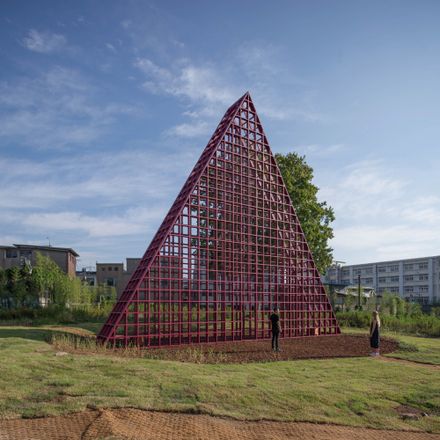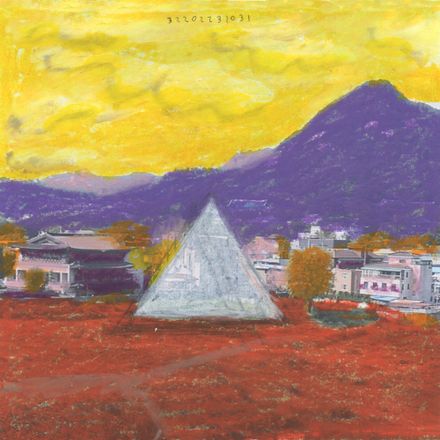
Pair Pavilion
DESIGN TEAM
Jerôme Lanche, Maria Fandiño, Giovanna Bartholeschi, Jean Orliac, Denis Wanders, Adrià Fenoll, Jerry Chang, Ming-hsien Llu, Lilian Chang, Lin Yun-jhu
LEAD ARCHITECTS
Pezo Von Ellrichshausen (Mauricio Pezo & Sofía Von Ellrichshausen)
COLLABORATORS
Beatrice Pedrotti, Lukas Vajda
CLIENT
Seoul Biennale Of Architecture And Urbanism (Seoul Metropolitan Government)
STRUCTURE DESIGN
Garam Structural Engineering
DIRECTOR
Byoung Son Cho
CONSTRUCTION
Joosung Design Lab. Co. Ltd.
YEAR
2023
LOCATION
Jongno-gu, South Korea
CATEGORY
Installations & Structures
Text description provided by the architects.
Before any social contract and right after our supposed subjective singularity, there is an individual mirrored in another individual, that is: a couple.
This unified character, synthesized in the double portrait (from Van Eyck to Hockney), is the idealized and certainly romantic inhabitant for this enigmatic piece.
Its figure, a stable equilateral triangle with almost no thickness, a kind of scaleless and building-less pediment, becomes the theatrical setting for a dramatic double relationship:
facing its only access, through a projection beyond its interior, turning the facade into a threshold between here and there; once inside, the projection becomes a direct, intimate, and inevitable relationship between one person and another at the opposite end.
Who are they? Maybe a real couple (a mother and her son, two friends, or two strangers), perhaps a fictional couple (one and their dreams, idols, or shadows).
The pavilion is certainly a space separate from the everyday world. It is a room for two, a resting place, a meeting space, a void filled with tension.
A vertical division, a gap in ordinary life, simply transfigured into a supernatural domain, even into a superstition, appears through an asymmetric peephole cut against the sky, occupying the unreachable corner of the interior. Such is the tension within this compact artifact.
From a distance, its regular silhouette exudes a discreet sense of monumentality, not only as a sign of itself but as a landmark outside of time. In explicit contrast with the surrounding landscape, its mirrored cladding (in a regular pattern of stacked stones) aims to reveal the subtle moods of the local climate.
Eventually, this flat figure will become a screen; the sun on the snow or a frozen pyramid for the summer season.
*Note: The pavilion is conceived in two stages; a temporary installation in the urban context of the Seoul Biennale of Architecture and its complete recycling for the permanent installation in a new botanical garden in Gyeonggi Province.

























